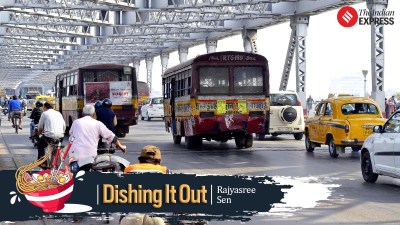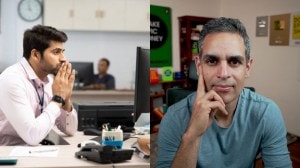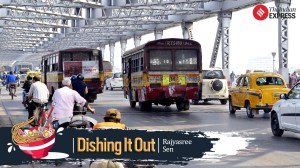‘If I believe in any power, it is randomness’
Lord Meghnad Desai, Emeritus Professor at the London School of Economics.

READ ALL THIRD EYE STORIES
Mail to author
Lord Meghnad Desai, Emeritus Professor at the London School of Economics.
What does spirituality mean to you?
It means nothing very much to me since I am an atheist. I do not believe in reincarnation or God or heaven, and I do not connect either morality or ethics or good conduct of life with spirituality. It is something completely alien to me and a lot of it should not be a matter of great pride. People emphasize the Upanishads and so on but how can a civilization believe in such great philosophical truths and treat people like shit? Hinduism is the only religion that even in theory does not believe in equality. It believes in being unequal at birth and forever. And that is very shocking. So while it may have high philosophical heights, its feet are not even of clay but of ashes since it is built on a tremendous rejection of people’s equality. Therefore, my turning atheistic was also a rejection of a certain kind of India, the whole ritualistic superstitious part of India which breeds inequality.
When growing up under Nehru, I actually had the hope that India would abandon it and become modern but it did not happen. India has been modernized but it has taken several steps back in terms of true modernity. Caste and superstition have been strengthened and politicized and the rest of the world admires India precisely for the things that keep it backwards. Spirituality is a weapon for the exploitation of dalits, women and so on. There is no such thing as secularism anymore. Even the communist party is totally mired into religion, lost in a mish-mash of petty nationalism claiming to be anti-American, while believing it can peddle into some secular Hinduism, which is total nonsense. There is a tolerance of religions which can be so damaging, such as people dogmatically saying “let us be nice to Muslims”: in doing so, a lot has been conceded to Muslim religious prejudices and no attempt has been made to modernize Muslim society, in particular for Muslim women who suffer from religious superstition and backwardness.
Observing all of that, I do wonder why superstition is so widespread and why 99.99% of people believe in some form of God. Uncertainty is certainly a large part of it, as people cannot handle it, and cannot handle randomness. And death is fundamental as well. I see it as the root cause of all religious beliefs. People cannot cope with the absoluteness of non existence. So they invented an after life and Gods because it is useful.
Do you believe you are guided and protected by a superior force?
There is no force protecting or guiding me. I do not feel I have done badly or well because of some benign or malign influence. Basically, I never needed God because nothing ever happened to me that I could not explain without the concept of God. It has all been hard work and luck. And to me, luck is randomness. So to the extent I believe in any power, it is randomness. People are eager to have serious explanations to random events and that is what drives them to God. If they were able to accept randomness instead of demanding a total explanation, there would be no need for God.
Do you believe you have a special mission or purpose in this life?
I do not believe there is a larger end to life, but I do things with a purpose and I do not do them mindlessly. Besides, if I was meant for one thing, it was for a life of ideas. My whole life has been an adventure of ideas. Wherever they took me, I just went. And life has thus been tremendously enjoyable. I never let myself be limited by any boundaries or restrictions. I conducted myself as a free spirit. Had I specialized in a certain subject, I might have been professor at an earlier age, but I was perfectly happy to be professor at 42. I chose to be like that, very widely spread in my interests, even as an economist. And it all began at the youngest age. I was forced-fed like a hot-house plant. I was in secondary school at seven and done with an M.A. before 20. I worked, worked and worked.
Why economics then? Growing up in the 50s, there were immense anxieties about jobs, especially for respectable middle-class families neither rich nor influential. My father was a minor civil servant and the caste I came from was incapable of any risk-taking. So the only thing I could do was to be a professional. I was programmed to have several degrees and be either a civil servant, or a doctor or an academic. I did not like mathematics so I did not choose a science degree; instead I went for economics, because it was the only way to get a job.
Then I got lucky, when I received a fellowship to go abroad. When you live in the West and work in academic circles, by and large, you meet very decent people. Had I been here, I would surely have had to compromise myself with some politician or professor. It is a rare academic in India who can claim not to have been corrupted by the system. Also, I was lucky not to have an unequal professor-student relationship such as the guru-shisha relationship can be, and which I abhor. On the overall, living there means being in a system with no status inequality. The British society is hierarchical but there is social equality. The fact that I am a Lord means nothing, no one treats me differently. The feudal habits that still prevail in India, the way people behave towards their servants, people constantly being humiliated because they are so called inferior and so on — all those things are not there and I am so grateful for that.
What is spirituality for you in your day to day life?
In the UK, there is generally a sort of neglect of religion, which does not play any significant role in the political or social life. So having lived there, it has been easy to carry on with life without worrying about religion. In this way as in many others, living in the West was a liberating experience. Also, on another level, I would add this: as soon as there is any unquestioning authority of a book, or a person, or a doctrine, one enters religious territory. This explains for instance why the application of Marxism by Lenin and others led to such atrocities. So one must always insist on being sceptical, doubting, questioning — all the time. It is the only guarantee of freedom. There is none other whatsoever. And I have always tried to do so, every day of my life.
Can you tell us about a unique experience that changed or shaped your spiritual beliefs?
I grew up in a quite regular Hindu family. My mother was very devout, the family goddess was Amba, a local version of Kali in Gujarat. My father would follow all the annual rituals. But I was a rather precocious child — I did not go to primary school more than a year and by the age of thirteen I was ready to finish secondary school. At that age, I thought there may be no God, and that there are no consequences of not believing in God. I decided to try and not believe, and see if something happens. Of course nothing did! And so since that day, I have been a staunch atheist. This “experiment” was the rupture and I never had a doubt about those atheist beliefs since then.
What have been your main spiritual inspirations?
I have carried on with life and its challenges without the need for spiritual inspirations. I just sit down and think about things, rationally. I never rush to gurus, teachers, friends, parents to face life’s issues. Dealing with life does not require to go and worship a piece of stone. On the other hand, from my earliest age, I discovered books and I would always describe my natural state as reading a book or writing something. Otherwise I do not know what I am doing.
If you were to be reincarnated, what would you like to be reincarnated as?
To me, no one will be reborn after, there is no punishment or reward, this is the only life we have and we’d better make the best out of it. So is there anything else I could wish for this one? Some friends of mine are still waiting for the great thing to happen, for instance at least a dozen are worried about not having yet received the Nobel Prize. I do not reason that way. I look back at what my ambitions when I was 18 — to read and write — and I am so much past that. I never thought I would be a professional economist, teaching in one of the best places in the world, having fantastic colleagues, having this adventure of ideas. The fact that I could make a living out of ideas rather than being a bureaucrat is so wonderful. Being an academic in the Western context is the freest you can be, because you have a salary and no boss, and you can do whatever you want. So I have had a fantastic life and I am going to go on having a fantastic life, because as long as the mind keeps functioning, ideas will come and I will develop ideas.
Also, I am now a happier person than I have ever been before, thanks to my wife. I was separated after a first marriage which had not been particularly happy. So to now have such a happy marriage is really marvellous.
If there was one question you could ask God, what would it be?
What else could I ask but this: when will this world get any better? When will we see the end of poverty, of superstition, of inequalities? I do not mind the world being a mess but I would like it to be more considerate to the weaker. Being a rational being, why would I have any hope of this happening? I guess I am allowed one irrationality!
What is your idea of happiness?
To be able to do what I want to do, without hurting anyone else. Basically, happiness to me is freedom. And of course it cannot happen on my own. We are all social beings and need others. Our only responsibility then is not to obstruct their chance of happiness.
- 01
- 02
- 03
- 04
- 05































